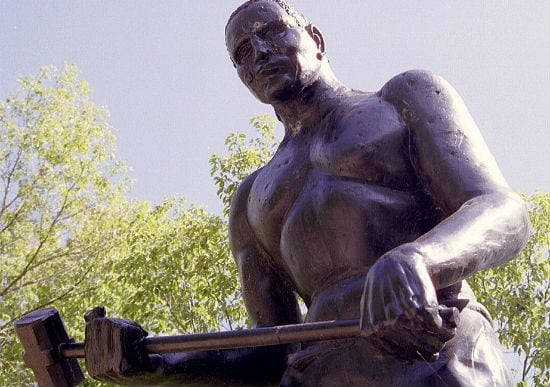National Public Radio’s Only a Game show (sports the NPR way) had a good multi-angle story this weekend on corruption in college sports. It took an unexpectedly religious turn in a segment “Tracing The Origins of College Sports Amateurism.”
They brought on Paul Putz, who’s studying history at Baylor and who has been doing some really interesting stuff on the intersection of sports and white evangelicalism, the idea of sports as moral formation, and the history of evangelical “sports ministries.” Putz guides us through a brief summary of a strange, and influential, moment in modern religion — the idea of “muscular Christianity.”
This devotion to amateur sports can be traced back to something called Muscular Christianity. It started in England, during the Industrial Revolution. The idea was that life was getting too easy for the middle and upper classes. Their bodies were getting weak.
“And meanwhile,” Putz says, “lots of lower class people are building up strength. They’re becoming muscular.”
Basically, those in power wanted to make sure they stayed in power.
“So it’s very closely tied with class, and with race, and with imperialism in the 19th century,” Putz says.
The show goes on to discuss how this influenced people like Teddy Roosevelet, and how it shaped the ideology of “amateurism” that today makes NCAA athletes the unpaid interns of a professional sports industry. And how it relates to why schools have huge sports programs at all (which is so customary that it can be hard to step back and consider how weird that is).
What struck me most, though, is the way that this “Muscular Christianity” is rooted in fear — specifically in fear of the physically stronger, and more numerous, working class. Here in America, this gets tied in to the nation’s congenital fear of black rebellion. It’s the same perpetual uneasiness that erupted into the white panic of the New York Conspiracy of 1741 (see here and here). The same fear described in the ending of Orwell’s essay on “Marrakech.”
Muscular Christianity took that fear and responded by saying, “We’d better starting working out.” This was gussied up with talk of sound minds in sound bodies, the education of the whole person, and fitness as moral character-building — all of which is fine on its own. But lurking there in the background was that terrifying idea that they were becoming stronger than us, and so we must prepare ourselves if they ever decide to do what we would do if we were in their position.
I think that same fear is a part of the reason we don’t have universal health care here in America. If the larger and physically stronger working class is “allowed” access to health care, then they’ll be that much more formidable when the day comes that they finally put us up against the wall. Their labor has made them stronger than us, but it also breaks their bodies and sickens them. If they started getting proper health care, there might be no stopping them.

Yesterday, I saw a clip from Fox News that illustrates the same kind of health-as-morality ideology taught by Muscular Christianity — the idea that perfect health is a moral obligation and a moral possibility, and that therefore health problems are also, in a sense, moral failings. And I think the clip also shows traces of the fear — fear of a strong and healthy underclass — that I’m describing above.
You can watch the clip here on Twitter. The anchor or emcee or ringmaster (or whatever they call these folks on Fox) mostly just expresses the kind of stingy paternalism that forces poor and working class Americans to jump through hoops, but consider the implications of his question.
“What’s the motivation?” he asks. “The poorest Americans, who are getting their co-pays and things like that covered, what’s the motivation for them to try to live a healthier lifestyle? I mean, if it doesn’t cost them anything to go to the doctor, what’s the motivation?”
He’s spinning this as concern for Medicaid recipients — as though what he wants is for them to “live a healthier lifestyle.” That, of course, is really about his hopes that “motivating” the poorest Americans to “live a healthier lifestyle” will mean they incur fewer health-care costs and don’t skew his insurance risk pool. Why should he have to pay — however indirectly — for other people’s care if those people have twice-over demonstrated their moral inferiority (first by being poor, then by getting sick)?
Note, though, the weird assumption this Fox spokesmodel seems to be making. If those people aren’t financially deterred from going to the doctor, then he imagines they will all be in perfect health all the time. He’s not just worried that access to health care will reduce their “motivation” to eat their veggies and exercise, he’s worried that access to health care will turn them into unstoppable, immortal juggernauts, superhumans impervious to sickness, pain and injury — into people who can no longer be subdued or suppressed.
For this guy, the legendary story of John Henry ends just as it should. The working man’s superhuman strength gets the tunnel built, but that task also broke his body and killed him. If, instead, John Henry was getting his co-pays and things like that covered, if it didn’t cost him anything to go to the doctor, well, then he might have survived, his strength intact. And then what could possibly stop him from turning his hammer in another direction and demanding a fairer share of the railroad’s wealth?















